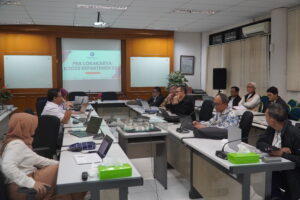Department of Resource and Environmental Economics at IPB University Prepares New Curriculum: Integrating Science and Global Challenges
Department of Resource and Environmental Economics at IPB University Prepares New Curriculum: Integrating Science and Global Challenges
 The Department of Resource and Environmental Economics (ESL) at IPB University is preparing to develop a new curriculum that is more adaptive and responsive to global dynamics and job market demands. This curriculum emphasizes the integration of scientific knowledge with practical, relevant approaches, aligned with the vision of fostering a sustainable and equitable economy.
The Department of Resource and Environmental Economics (ESL) at IPB University is preparing to develop a new curriculum that is more adaptive and responsive to global dynamics and job market demands. This curriculum emphasizes the integration of scientific knowledge with practical, relevant approaches, aligned with the vision of fostering a sustainable and equitable economy.
In designing this new curriculum, the ESL Department is adopting the “Doughnut Economy” approach — a concept that balances economic growth, social justice, and environmental sustainability. This economic paradigm addresses global challenges such as resource crises, climate change, and social inequality.
Additionally, the “Comprehensive Neo-Schumpeterian Economics” (CNSE) approach is incorporated, highlighting innovation and adaptation in navigating future uncertainties. The curriculum will also introduce new courses reflecting contemporary issues, including digital economy, health economics and epidemiology, carbon economy, and blue-green economy.
Core components remain intact, covering micro-macro economics, quantitative methods (mathematics, econometrics, dynamic modeling), as well as economic valuation and natural resource accounting. Furthermore, supporting courses such as sustainability analysis, behavioral economics, resource risk analysis, and political and institutional economics are added.
Beyond theory, the new curriculum emphasizes practical skill enhancement through various modern learning methods. Students will be equipped with resource and environmental modeling, machine learning, data mining, and evidence-based policy analysis. Field experiences are also prioritized, including field study programs, internships, international student exchanges, and collaborative research at national and global levels.
Through this transformation, the ESL Department aims to produce graduates who not only possess strong scientific knowledge but also practical skills and critical thinking abilities, ready to tackle real-world challenges.


